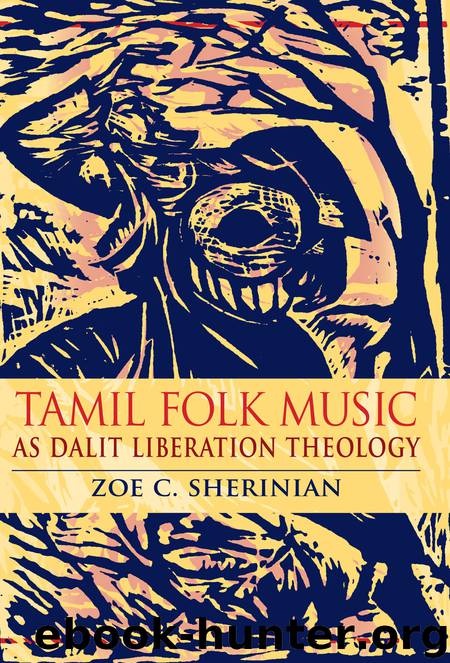Tamil Folk Music as Dalit Liberation Theology by Zoe C. Sherinian

Author:Zoe C. Sherinian
Language: eng
Format: epub
Publisher: Indiana University Press
Published: 2014-03-16T04:00:00+00:00
To these upper sectors of society the outcastes are nameless; they have no self and no identity of their own. They do not count, except, of course, when there is work to be done to produce wealth, to create leisure and the conditions for the development of culture, and to keep society healthy. They are avarnas, colorless and nondescript; or pancamas, those left over as it were after the four castes have been counted; or antyajas, last-born, as if they were an accident, an unwelcome appendix, an unwanted tail . . . But now these nobodies are beginning to name themselves, to show a new self-awareness, to find their own identity, and to claim their due place in society. They are beginning to call everybody’s attention to their existence . . . They refuse to be harijans, that is, the people of the god of the upper castes and oppressors. They call themselves dalits (oppressed) . . . They are holding up for all to see a terrible truth Indian society has always sought to keep in the dark; India has shrouded in much pious and metaphysical verbiage the truth about the large-scale slavery, violence, exploitation, apartheid, and cruelty on which its proud culture rests. (Rayan 1992, 129–130)
Rayan recognizes the action of Dalits to name themselves and in so doing blatantly draws attention to India’s oppressive social hierarchy. Few others have recognized the resistive elements of reversal through re-creation in folk culture, however.
Reversal of purpose becomes Appavoo’s radical approach to both the understanding of social norms and traditional interpretation of biblical stories. His social goals are first to reverse the value of private property and money over human relationships, and second to reverse (and ultimately equalize) the hierarchies of class, caste, and gender. His theological goals are to reverse the metaphor of Jesus as king, portraying him instead as a farmer or working-class political leader who rides a working animal, the donkey.57 Appavoo also attempts to reverse the patriarchal foundation of Christianity by interpreting the qualities of God as both masculine and feminine. He has found that interpreting Jesus’ actions as efforts to primarily benefit the poor and oppressed challenge traditional Indian and Western interpretations that support status quo power relationships, particularly of class and gender.
Download
This site does not store any files on its server. We only index and link to content provided by other sites. Please contact the content providers to delete copyright contents if any and email us, we'll remove relevant links or contents immediately.
Aircraft Design of WWII: A Sketchbook by Lockheed Aircraft Corporation(32282)
The Great Music City by Andrea Baker(31916)
Call Me by Your Name by André Aciman(20491)
The Secret History by Donna Tartt(19048)
The Art of Boudoir Photography: How to Create Stunning Photographs of Women by Christa Meola(18613)
Shoot Sexy by Ryan Armbrust(17720)
Plagued by Fire by Paul Hendrickson(17405)
Portrait Mastery in Black & White: Learn the Signature Style of a Legendary Photographer by Tim Kelly(16996)
Adobe Camera Raw For Digital Photographers Only by Rob Sheppard(16969)
Photographically Speaking: A Deeper Look at Creating Stronger Images (Eva Spring's Library) by David duChemin(16681)
Ready Player One by Cline Ernest(14639)
Pimp by Iceberg Slim(14484)
Bombshells: Glamour Girls of a Lifetime by Sullivan Steve(14052)
The Goal (Off-Campus #4) by Elle Kennedy(13657)
Art Nude Photography Explained: How to Photograph and Understand Great Art Nude Images by Simon Walden(13031)
Kathy Andrews Collection by Kathy Andrews(11812)
The Priory of the Orange Tree by Samantha Shannon(9063)
The remains of the day by Kazuo Ishiguro(8969)
Thirteen Reasons Why by Jay Asher(8893)
